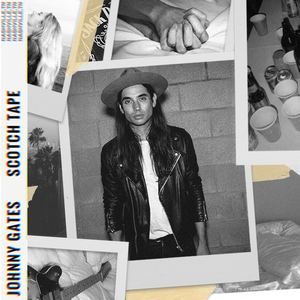Nashville's Johnny Gates Releases New Single 'Scotch Tape'
Reminiscent of early 2000’s alt-country and being young, broke and in love.

Today Johnny Gates shares the brand new single "Scotch Tape", a redemptive alcohol-infused break-up anthem, reminiscent of early 2000's alt-country and being young, broke and in love. "Scotch Tape" follows this summer's singles "Loretta Lynn" and "Buy You A Beer", which won positive attention from NPR Music's "New Music Friday" playlist and Sounds Like Nashville among others.
"Scotch Tape" according to Gates, describes "a relationship that's rough around the edges, but in all the best ways." Gates shares that he has "totally been in this kind of relationship, where the girlfriend's mom questions my tattoos, the partying a little too much, the drunk fights about absolutely nothing haha, but just because our relationship didn't look totally conventional, we made it work. And when things got hard, or funds got low, or we almost broke up, we always knew we had each other to get through it."
Gates was raised on equal parts Dashboard Confessional and The Get Up Kids, his parents love of 80s rock, and the Lucinda Williams and Johnny Cash records his Nana would put on at their family owned Italian restaurant. He's equally at ease on music row, or taking in some of his favorite indie artists like Julien Baker or Lucy Dacus at a gig in East Nashville. But it was hearing Taylor Swift's "Tim McGRaw" on the radio while driving around his home town in Rhode Island that changed his life.
"It was revelatory to hear someone young, singing country, but over the cool production, and I immediately googled her producer, Nathan Chapman and shot him an email," recall's Gates. He made up a story about his band, Runaway Saints, making a planned trip to Nashville and wanting to meet him, and he was shocked when Chapman actually wrote back. "We dropped everything and drove to Nashville the next day." That set off a whirlwind for Johnny and the band. They all found part-time jobs and would write with Chapman a night after work. The four songs they recorded ended up on the desk of a major label CEO and shortly after they had signed a deal. "We had only been living in Nashville for four months," remembers Johnny of that period, "the experience was absolutely surreal. We had been an indie band slaving away to play in front of no one for half a decade, and all of a sudden, we were label mates with huge artists and opening for national arena tours, it all happened so quickly we didn't have time to question it."
The paradigm shift of signing to a major country music label as a rock group at a time when not being "country enough" was a big hurdle for some artists, took its toll on the band. They celebrated four years on the label, going to CMA parties, playing all the big festivals, and writing with the biggest writers - but ultimately weren't putting out music or feeling fulfilled. "I started to really envision this different direction for us, and I think it was hard on the guys. In the process, we kinda forgot what band we even were." Faced with the choice of staying in their deal or saving the band he'd dedicated everything to for the better part of a decade, Johnny stayed loyal to his bandmates. "I remember being pretty against it, because honestly, I had the most to lose," he says. Johnny had spent plenty of time as an up and coming musician scrapping for new fans and recognition before moving to Nashville, but their quick success after arriving meant his whole existence in "Music City" had been tied to his bands' status in town as a major label act. It was hard to imagine, and even a little embarrassing, to think of giving that up and going back to square one.
As a way to reset, the band decided to move to Los Angeles. Even though they continued to go on great tours the move out west would be the band's final chapter, but serve as a bit of a rebirth for Johnny as an artist. The cost of living in LA "really kicks your ass when you're an up and coming artist or band, but there is a sort of genre less freedom that exists there," he explains, "I just really wanted to hit refresh, and that's what I did." He went back to basics, dragging his gear around Hollywood and begging for stage time at clubs to play for people who had no idea who he was. This time as a solo artist. "It was honestly thrilling," says Johnny, "I felt more connected to me, than I had felt in years." In LA he befriended Tyler Thompson, who would become Johnny's main collaborator and producer. The two of them started recording in a little apartment in Hollywood off Highland. "When everyone was gone, and the label was gone, and the expectations were gone, and it was finally me making a decision, the music that came out, was country, but my take on country, and we got to work."
After two years away Johnny returned with a renewed sense of confidence in himself. "I got over the fact I didn't have a deal, because I had songs and a project I believed in," says Johnny. "So, I played one last Troubadour show, threw my shit into a storage unit in North Hollywood, got rid of my apartment in studio city (which i loved), and booked a one way ticket back to Nashville. And just like that, his musical journey had come full circle. He found himself once again, humbly pointing his wheels to Music City - the town that had started it all, to chase that which had changed everything - the song.
Listen here:
Comments
Videos

